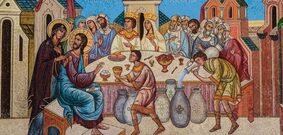
We are going to begin today with a little quiz!
Can you guess the following mission statements to its company?
(Google): “To organize the world's information and make it universally accessible and useful.”
(Starbucks): “To inspire and nurture the human spirit – one person, one cup and one neighborhood at a time.”
(Nike:) “To bring inspiration and innovation to every athlete in the world.”
And:
(CPC-Merrick)
Our church takes the word "community" in our name seriously. We are a community of love, accepting and welcoming all to our church family, and centered in the teachings of Jesus Christ. While we come from diverse backgrounds, we gather as a united family to joyfully worship God's amazing grace in praise and thanksgiving.
(FPC-Freeport)
Our mission is to do justice, and to love kindness, and to walk humbly with our God” as we look towards a new heaven and a new earth (Micah 6:8)
Mission statements are de riguer for any self-respecting organization. Mission statements are meant to capture the essence of the organization’s vision in concrete ways. The mission statement guides the organization to successful outcome that should be measurable. Google boosts of 5.6 billion searches a day. Starbucks prepares about 4 billion cups of joe and other exotic beverages a day. Nike sells 25 pairs of shoes a second.
To achieve the best possible outcomes in life, we need to have a purpose. With a purpose, a vision, we can then set goals, even if they are modest or day by day. You had a goal to get to church today – or those watching remotely, to attend worship from home. One of my son’s goals is to get a degree in computer science, which he is chipping away at semester by semester. My daughter wants to get a driver’s license. So, she is studying the manual to get her learner’s permit. We tend to get more out of life when we set goals and work to achieve them. As Christians perhaps those goals might include reading the Bible every day, reaching out and helping others. Ultimately each of us is called to have a vision, and ideally create a mission statement for ourselves. To borrow from Nike, to bring inspiration to every person we meet. To share the good news in some way with those whose path we cross. How many of us actually have a personal mission statement that we review on a regular basis? What would it be like to create one and live by that message?
In this week’s Gospel reading, we hear what we might call Jesus’ mission statement. They are his first words in Luke. The passage makes this scene very important to understanding who Jesus is and what he is up to. It points us to not only Jesus’ future, but the future he has carved out for us in his ministry, death and resurrection. Jesus, accompanied only by the Holy Spirit, went to his hometown of Nazareth. That tells us something about Jesus’ mission: he intends to focus his concerns on the ordinary person, not the high and mighties of the world.
Likewise, in our Hebrew scripture readings from Nehemiah, we see how the ordinary people, assembled in a rebuilt Jerusalem regain a mission, a purpose for themselves. Nehemiah, the bureaucrat, governor and master planner, rebuilt the destroyed Temple and Jerusalem in the fifth century before Christ. At that time the city was in utter ruins. Through the hard work of Nehemiah, the city was rebuilt and repopulated. Finally, the temple was rededicated. The people rededicated themselves to God after the long captivity by foreign powers. During this inaugural ceremony, the priest Ezra read from the Law of Moses, all day, in the great square. The people heard the message, the mission of the covenant people, and the community was renewed. In this act of reclaiming their history, people wept. They had rediscovered their mission, their purpose. The people were exhorted to put away their tears; to rejoice once more. They were home. They were free. There was hope. They were ready to start over. They realized their had a vision, a mission a purpose. Proverbs 29:18 reminds us that “Where there is no vision, the people perish: but happy is the person who keeps the law.”
So Jesus went to Nazareth, his hometown, the place that had quite a reputation as a bit of a dungheap of a town, if we are listen to the disciple Philip who said, “Can anything good come out of Nazareth?” (John 1:45). Yet is was in Nazareth Jesus begins, and he starts in the synagogue. He got up to read words from the prophet Isaiah, chapter 61: 1-2: “The Spirit of the Lord is upon me, because he has anointed me to bring good news to the poor. He has sent me to proclaim release to the captives and recovery of sight to the blind, to let the oppressed go free, to proclaim the year of the Lord's favor. “Then he sat down. He concluded with the briefest of commentary: “Today this scripture has been fulfilled in your hearing.” Jesus states his mission. He and the mission are one.
Jesus built his mission statement, and the symbolism surrounding it, from a passage in Isaiah written to console the people still in captivity. From this passage, Jesus states his mission, sets the agenda and the tone for what he would be doing in the next three years. He would be about bringing good news to poor people. Proclaiming release to captives and recovery of sight to the blind. Letting the oppressed go free, and all about proclaiming the year of the Lord’s favor, the year of jubilee, when property gets returned to people who have lost it, when debts are forgiven, and people are restored.
According to the book of Leviticus, the Year of Jubilee (Lev. 25:10), was set at every seven years and every fifty years, according to the Law of Moses. In the time of Jubilee – God’s favor -- “no business as usual can be done…slaves must be given their freedom…families can return to lands lost in litigation…farmland and field get a Sabbath of rest, for there can be no planting or harvesting; debts are…cancelled.” The Jubilee Year is to be a for-taste and celebration of the Kingdom of Heaven. Now there is little evidence that Jubilee was ever followed. It was too radical and just too hard -- Liberation, restoration, health cared for, jails unlocked, land returned: a time to start new. Yet Jesus reclaimed that mission -- to embody the compassion and justice of God to everything but especially to the overlooked, downtrodden, forgotten people of the world. God’s favor was key in Jesus’ ministry and his intent to establish community that would mirror the heavenly kingdom, to which we are heirs in Jesus’ name. We are the flag-bearers of that jubilee. That is Jesus’ mission statement…and ours.
Let us make 2022 a flagship year by putting into practice this mission statement. Today we make Jesus’ mission statement our own. We will carry out the goals of jubilee: being good news bearers. Casting light were there is darkness. Freeing those who are bound by oppression in all its forms and sin. May the spirit of Jubilee – God’s favor –be our purpose. May the joy of this mission be our strength, as we continue the journey in 2022, faithful until the mission of Jesus is fulfilled everywhere on earth. Amen.






 RSS Feed
RSS Feed